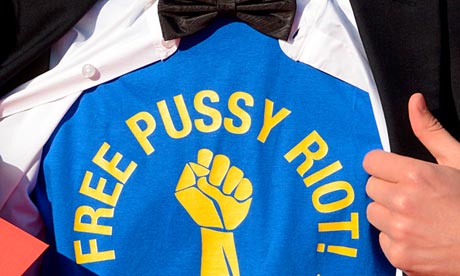
Members of the anti-Kremlin punk collective Pussy Riot have called on people to flood Russia with letters of support for two of its members jailed in remote prison camps by the Putin regime.
Two Pussy Riot members – who cannot be identified for security reasons – have visited Britain on a world tour to raise awareness for the plight of their colleagues, meeting British MPs and visiting parliament.
"The conditions in Russia are very inspiring to activism," wryly noted one member calling herself Schumacher. "We are here to tell people what is happening in Russia; what happened and what continues to happen […] these laws are connected to Pussy Riot because they are aimed at the issues we stand for: LGBT rights and gender equality."
The group is particularly concerned about a raft of new legislation from the Kremlin. NGOs which receive funding from abroad have been forced to label themselves as "foreign agents" and earlier this year were subject to a series of raids. This month the Russian parliament unanimously passed a federal law banning gay "propaganda", a crackdown critics argue has led to a sharp increase in anti-gay violence, while also approving a new law allowing jail sentences of up to three years for "offending religious feelings".
Two members of Pussy Riot are serving sentences in separate camps after performing an anti-Putin "punk anthem" in a Moscow cathedral in February. Maria Alyokhina, 24, is serving the remainder of her two-year term at a women's prison camp in Perm, an area in Siberia known for the harsh conditions of its camps. Nadezhda Tolokonnikova, 22, is in Mordovia, a region that also hosts a high number of prisons. A third member, Yekaterina Samutsevich, was released earlier this month after being given a suspended sentence.
A group member known as Serafima urged supporters to continue to write to the women, even though it is thought that they are not yet receiving letters written in English. "It is their legal right to receive letters, so activists should continue writing," she said, adding that letters translated by automatic software may stand more chance of getting to the prisoners more quickly. On a tour which has so far encompassed Washington DC and New York, the pair had been overwhelmed by messages of support, they said.
"We are beginning to understand that it is not just a group – it is becoming a movement; we are inspiring people around the world and they are inspiring us. Everyone can become Pussy Riot if they share the same ideas," said Schumacher.
Pussy Riot had gained popular support in Russia after hosting a protest in Red Square, but many of their countrymen found the protest in a Moscow cathedral a step too far. "We were aware and prepared for how it would be seen," said Seraphima. "But there can be no compromise – it is our way of following the things we believe in."
Schumacher added: "We love our country, its history, its culture but we want to help improve it and make life better there than it is now."

